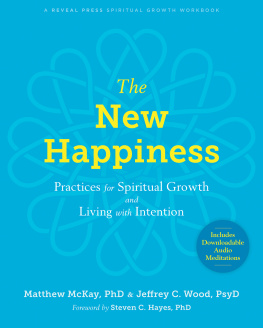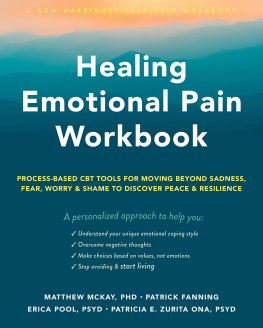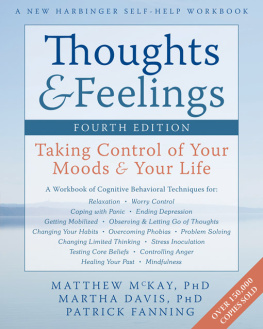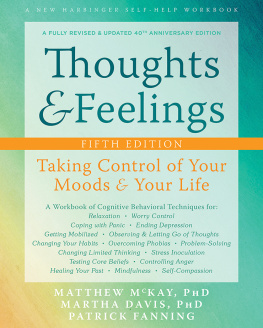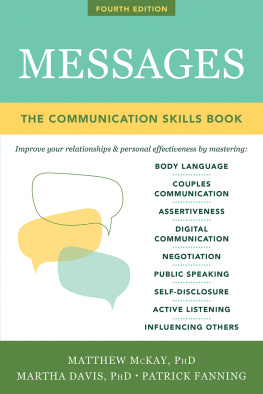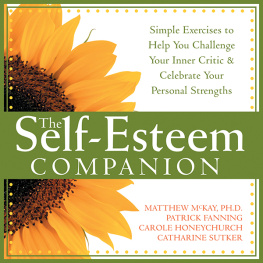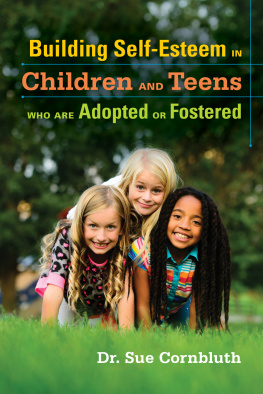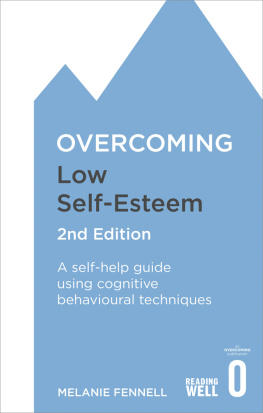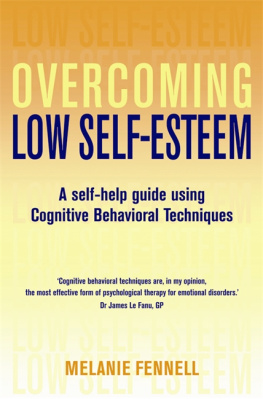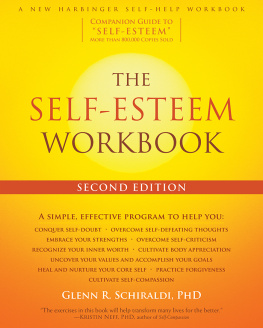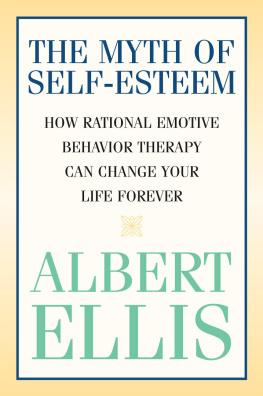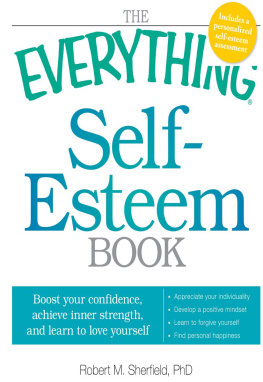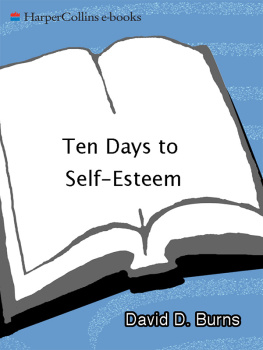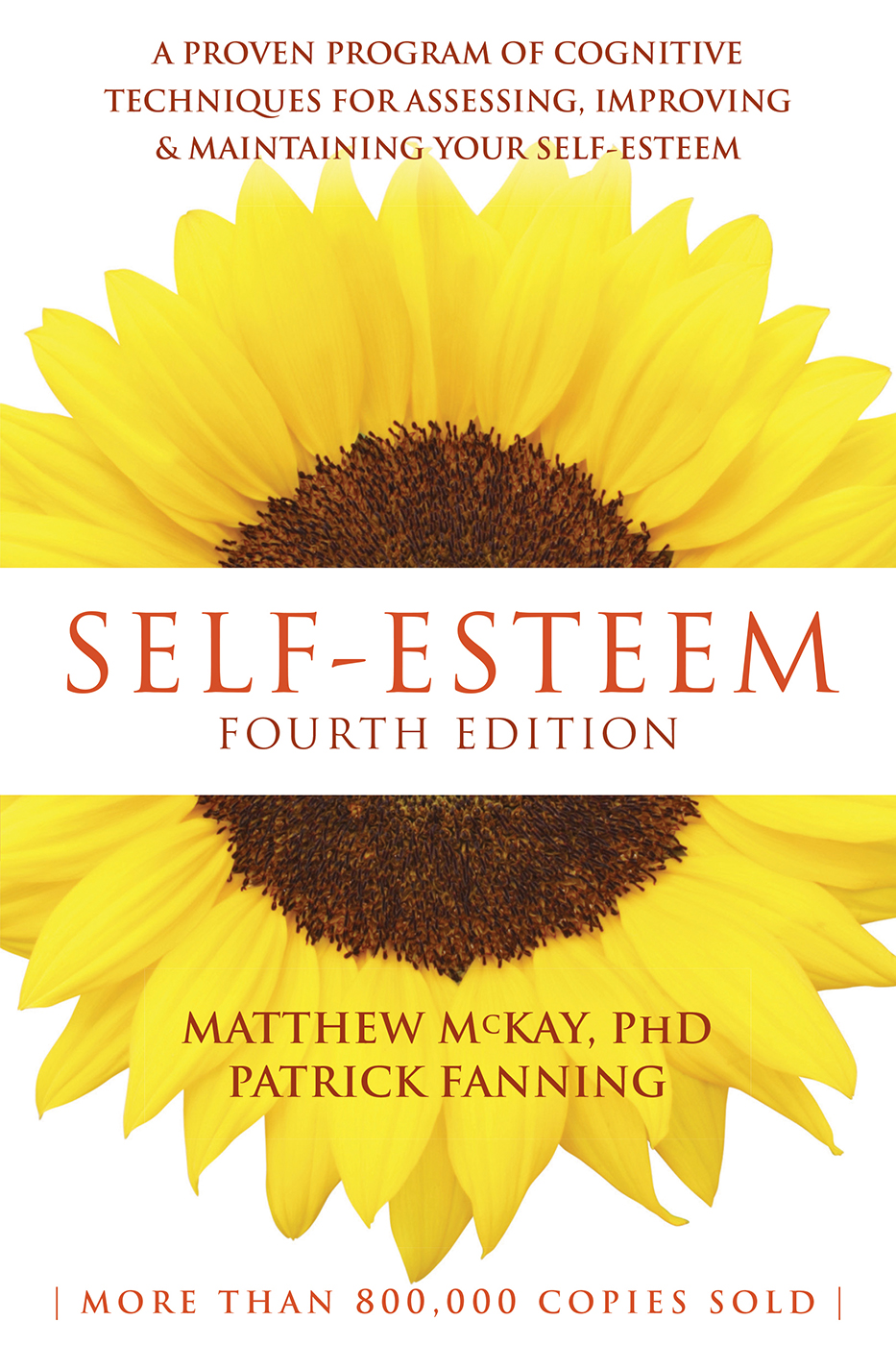
McKay and Fanning recognize the complexity of the human tendency toward self-criticism. Their carefully written, cognitively oriented self-help book wisely avoids simplistic solutions, offering instead a systematic approach to self-esteem development.
Robert E. Alberti, PhD, author of Your Perfect Right
Positive self-esteem is the centerpiece of a healthy personality. McKay and Fannings book offers us a valuable storehouse of tactics and strategies for constructingor renovatingthe foundation of our self-esteem.
Philip G. Zimbardo, PhD, author of Shyness
Self-Esteem is truly a very special title. Good writing is especially necessary for self-help titles. I feel a special enthusiasm in bringing it to the notice of our audience.
The Midwest Book Review
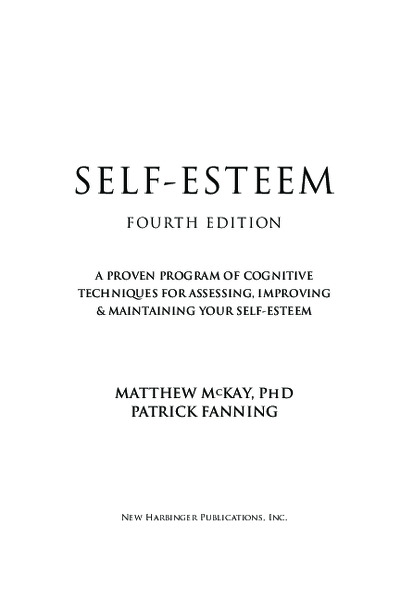
Publishers Note
This publication is designed to provide accurate and authoritative information in regard to the subject matter covered. It is sold with the understanding that the publisher is not engaged in rendering psychological, financial, legal, or other professional services. If expert assistance or counseling is needed, the services of a competent professional should be sought.
Distributed in Canada by Raincoast Books
Copyright 2016 by Matthew McKay and Patrick Fanning
New Harbinger Publications, Inc.
5674 Shattuck Avenue
Oakland, CA 94609
www.newharbinger.com
Cover design by Amy Shoup
Acquired by Melissa Valentine
Edited by Gretel Hakanson
All Rights Reserved
Library of Congress Cataloging-in-Publication Data on file
To my loving parents, Bert and Grace Fanning P. F.
In memory of my father, George Edward McKay M. M.
Grateful acknowledgment is made to Eugene B. Sagan, PhD, who introduced me to the pathological critic and some of the important techniques used in this book. M. M.
Contents
The Nature of Self-Esteem
Self-esteem is essential for psychological survival. It is an emotional sine qua nonwithout some measure of self-worth, life can be enormously painful, with many basic needs going unmet.
One of the main factors differentiating humans from other animals is the awareness of self: the ability to form an identity and then attach a value to it. In other words, you have the capacity to define who you are and then decide whether you like that identity or not. The problem of self-esteem is this human capacity for judgment. Its one thing to dislike certain colors, noises, shapes, or sensations. But when you reject parts of yourself, you greatly damage the psychological structures that literally keep you alive.
Judging and rejecting yourself cause enormous pain. And in the same way that you would favor and protect a physical wound, you find yourself avoiding anything that might aggravate the pain of self-rejection in any way. You take fewer social, academic, or career risks. You make it more difficult to meet people, interview for a job, or push hard for something where you might not succeed. You limit your ability to open yourself with others, express your sexuality, be the center of attention, hear criticism, ask for help, or solve problems.
To avoid more judgments and self-rejection, you erect barriers of defense. Perhaps you blame and get angry, or bury yourself in perfectionistic work. Or you brag. Or you make excuses. Sometimes you turn to alcohol or drugs.
This book is about stopping the judgments. Its about healing the old wounds of hurt and self-rejection. How you perceive and feel about yourself can change. And when those perceptions and feelings change, the ripple effect will touch every part of your life with a gradually expanding sense of freedom.
Hundreds of researchers have quizzed thousands of people of various ages and situations, trying to see what causes self-esteem, who has the most of it, how important it is, how it can be increased, and so on.
Studies of young children show clearly that parents style of child-rearing during the first three or four years determines the amount of self-esteem a child starts with. After that, most studies of older children, adolescents, and adults share a common confusion: What is cause, and what is effect?
Does academic success foster self-esteem, or does self-esteem foster academic success? Does high social status cause high self-esteem, or does high self-esteem help you gain high social status? Do alcoholics drink because they hate themselves, or do they hate themselves because they drink? Do people like themselves because they do well in job interviews, or do they do better in interviews because they like themselves?
These are classic chicken-and-egg questions. Just as eggs come from chickens and chickens come from eggs, it seems that self-esteem grows out of your circumstances in life, and your circumstances in life are influenced strongly by your self-esteem. Which came first? The question has serious implications for your success at raising your self-esteem.
If external circumstances determine self-esteem, then all you have to do to improve your self-esteem is to improve your circumstances. Lets say you have low self-esteem because you never graduated from high school, youre short, your mom hated herself, you live in the slums, and youre 100 pounds overweight. All you have to do is go to night school and get your degree, grow about six inches, have been raised by a different mother, move to Beverly Hills, and lose 100 pounds. Its a cinch, right?
But you know youll never make it. Theres nothing you can do about your parents or your height. Your only hope is that things are the other way around: that self-esteem determines circumstances. This means that if you improve your self-esteem, your circumstances will improve. So just stop hating yourself, and youll get taller, your mom will become somebody different, and those 100 pounds will evaporate like the morning dew.
If you feel that this second scenario is also a little unlikely, you can be congratulated on a keen appreciation of the real world.
The fact is that self-esteem and your circumstances are only indirectly related. There is another intervening factor that determines self-esteem 100 percent of the time: your thoughts.
For example, you look in the mirror and think, Boy, am I fat. What a slob. This thought clobbers your self-esteem. If you looked in the mirror and thought, Well, all right, it looks good to wear my hair like this, the effect on your self-esteem would be the opposite. The image in the mirror remains the same. Only the thoughts change.
Or lets say that youre discussing the news, and when you make a remark about the right-wing rebels, your nitpicking friend corrects you: No, you mean the left-wing rebels. If you tell yourself, I really sound stupid, your self-esteem will take a nose dive. If you say to yourself, Oh yeah, Ive got to keep that straight next time, your self-esteem will not suffer so much. In either case, you dont change the circumstances, only how you interpret them.
Does this mean that circumstances have nothing to do with self-esteem? No. Obviously, in the area of social status, bank vice presidents have more opportunity to feel better about their careers than cab drivers. This is why a study of 100 vice presidents and 100 cab drivers will prove that the higher status job leads to higher self-esteem. What is overlooked among the statistics is that there are some vice presidents who slaughter their self-esteem by telling themselves,
Next page

